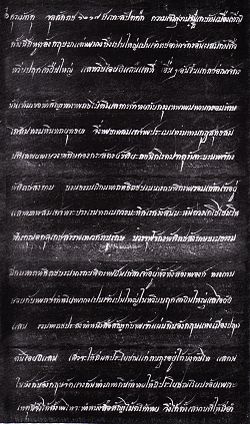Anglo-Siamese Treaty of 1855
| Treaty of Friendship and Commerce between the British Empire and the Kingdom of Siam | |
|---|---|

Thai version of the Treaty, written on Thai black books, prior to being sent to the British Empire to further be affixed with her seal.
|
|
| Type | Treaty |
| Signed | 18 April 1855 |
| Location | Bangkok |
| Parties |
|
| Language | Thai and English |
|
|
|
The Bowring Treaty is the name given to an agreement signed on 18 April 1855 between the United Kingdom and the Kingdom of Siam that liberalized foreign trade in Siam.
The treaty was signed by five Siamese plenipotentiaries and by Sir John Bowring, Governor of Hong Kong and Britain's envoy.
A previous treaty had been signed between Siam and the United Kingdom in 1826, and the new treaty elaborated and liberalized trade rules and regulations by creating a new system of imports and exports.
The treaty allowed free trade by foreigners in Bangkok, as foreign trade had previously been subject to heavy royal taxes. The treaty also allowed the establishment of a British consulate in Bangkok and guaranteed its full extraterritorial powers, and allowed Englishmen to own land in Siam. The regulations in short are:
Officially a Treaty of Friendship and Commerce, it is nonetheless claimed to be an unequal treaty as Siam was not in a position to negotiate, considering that Britain had demonstrated its military might during the First Opium War with China, thereby discouraging any attempts to prevent Western trade. Siam's fears were only consolidated by the fact that negotiations that had occurred five years earlier between Sir James Brooke, the White Rajah of Sarawak and British envoy, and Siam's King Nangklao had failed, and had led to Brooke threatening Siam with Britain's gunboat policy. The treaty eventually led other foreign powers to sign their own bilateral treaties, based on the rules set by the Bowring Treaty. Indeed, American envoy Townsend Harris, while on his way to Japan, was delayed in Bangkok for a month by finalization of the Burney Treaty, but had only to negotiate a few minor points to convert it into the 1856 American Treaty of Amity, Commerce, and Navigation with Siam. The Bowring treaty in particular ensured that foreign powers would not intervene in Siam's internal affairs, and allowed for Siam to remain independent. The Bowring Treaty is now credited with having led to the economic development of Bangkok, as it created a framework in which multilateral trade could operate freely in Southeast Asia, notably between China, Singapore, and Siam.
...
Wikipedia
